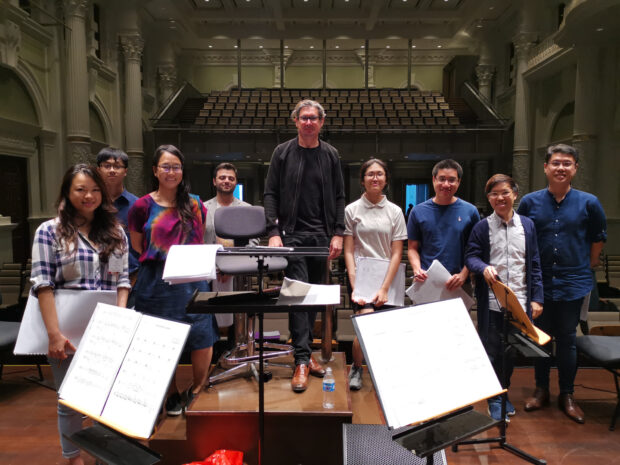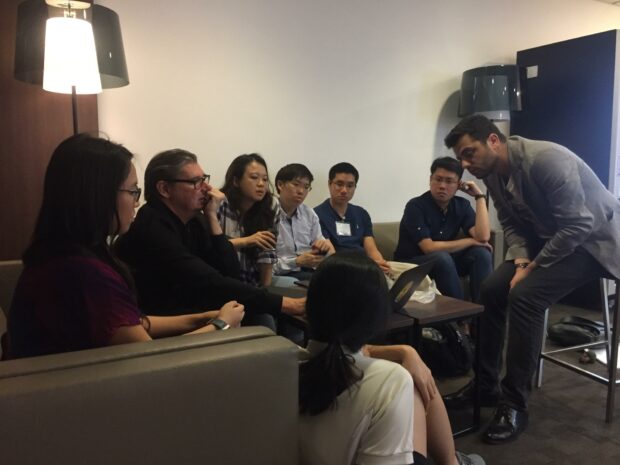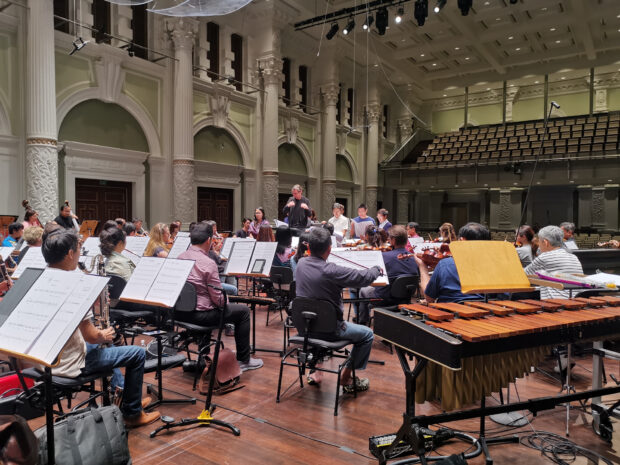

In January, at the invitation of the Singapore Symphony Orchestra, renowned Hollywood orchestrator and conductor Tim Davies facilitated a two-day workshop in Singapore on arrangement and orchestration. Davies is recognised for his prolific work on video games, including Sims, Resistance, Batman franchises and the recent Marvel Spider-man game. His film and TV highlights include La La Land, Minions, The Muppets, Empire, The Lego Movie 2, and Frozen 1 & 2.
Eight participants were invited to arrange a piece of music, which Davies then led the SSO in performing, providing useful tips and critique. In addition, over 200 observers came to watch the workshop over two days. We speak to Davies to learn more about the art of orchestration, and his thoughts on the first such workshop with the SSO.
Could you tell us about the role of an orchestrator in film music production?
Unless you are John Williams and still use pencil and paper, all film composers write their music into a computer. They make what we call a “demo” version using synthesizers and sampled instruments. They play this for the director and producer, get feedback, and make changes. This goes back and forth until everyone is happy.
The composer will then move on to the next cue — and this is where I come in. The computer version is sent to me and I make the written score. I translate the demo, make sure every note is right, fill in where the composer did not have time, and add the dynamics and articulations. When we are at the actual recording session, we do not rehearse, we just start recording. It’s my job to get the right information into the score so that the first performance can sound like it has been played before.
Sometimes I work for composers that are not experienced with the orchestra. Maybe they come from a pop or alternative background. In these cases, I make sure what they have in their head gets put in front of the orchestra.
Most think that in order to be an orchestrator, you need a formal degree in composition and performing. Is that true?
No one gets hired because of their degree. But what having a degree gives you is time in a music school to immerse yourself in all things orchestration. There are classes and concerts to attend but more importantly other students who play all of the instruments. You can write for them and ask them questions. When I was at the Queensland Conservatorium, I never actually took an orchestration class, but I did put together my own orchestra on several occasions for both concerts and recording and learned everything the practical way.
In the Singapore workshop, you conducted the SSO where they played the participants’ re-arrangements, pausing to make tweaks along the way. Is that similar to what you do when leading a studio recording?
When an orchestra plays in the concert hall, they have all played it before, so they know how it goes and where their part fits into the overall composition. This is not the case in the studio. Everything we play has never been played before so I am the first person that gets to comment on it. I have to tweak balances and phrasing — the fine details that cannot really be put into the score. There might be questions about notes that I have to be able to answer quickly, analysing the harmony to check for mistakes. Or a section might not work because of some technical thing — such as a gap in a phrase due to shifting positions and crossing strings on the violin. The composer might not want a gap, so I have to work out a solution, but first you have to know why it came out that way. I have always been fascinated by all the instruments and how they work, so working out things like that are very easy for me. Then I get feedback from the composer and director and make any changes.

I also tend to keep my movements small and stay out of the way. The players are all sight-reading and if you move about too much you get tuned out. By staying out of the way, when I do need to get their attention, they notice and respond.
Overall, how do you think the participants did at the SSO workshop?
We all had an amazing experience at the workshop. It was a very unique opportunity, not just for the participants but also myself, to get that close and intimate with the orchestra. It was also fascinating that all eight participants did different things. Everyone brought out different details, so even though we spent a lot of time playing the same piece, it always felt fresh. I also had them orchestrate play some of my music and showed them how things would be done in Hollywood.

Working on films is one of the few jobs for an orchestrator that actually pays good money. There are many things we do different from the concert hall (experience) - things designed to make it as easy as possible for the musicians and maximise our studio time. It is very expensive to record orchestras, so everything the orchestrator can do to make it go quickly and smoothly is important. There are also a few tricks to making the ‘Hollywood’ sound and we discussed and tried some of them.
What did you hope participants took away from the sessions?
A few things! Firstly, just the thrill of being this close to an orchestra. For the last run through, I had all of them come up on stage and stand right with me, some were even in the string section. You can’t do that in a concert. Secondly, the opportunity to see the players react to the music and get feedback. The players gave credit where it was due, but also lots of great constructive advice.


All in all, it was an incredible opportunity, aside from learning the technical aspects, by just going through the process of working with professional and rightfully picky musicians of a full-sized orchestra, the SSO no less. I went through a roller coaster of emotions … and in the end, basically learnt to be more comfortable working with other personalities, and to be more confident in my decisions. It’s more like a soft skill that is hard to quantify.
Any composer’s music that you love best, that is best suited for film — genre-specific or otherwise?
I am a huge Prokofiev fan. Even before I went into working in film music, my favourite piece of music was his “Alexander Nevsky” cantata, which actually comes from his film score for the movie of the same name. I love the way he twists things a little and I’ve found that those techniques served me well when I write music for film and TV. Subtle shifts that change an emotion. His orchestration is also amazing. So much can be learned just from that one piece.
Tim Davies writes an orchestration blog at www.debreved.com